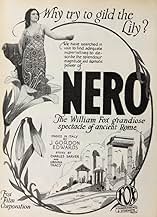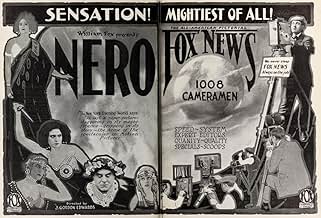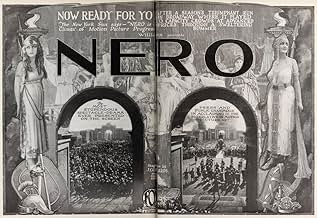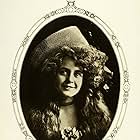Biography portraying the life of the Roman Emperor Nero.Biography portraying the life of the Roman Emperor Nero.Biography portraying the life of the Roman Emperor Nero.
- Awards
- 1 win
Sandro Salvini
- Horatius
- (as Alexander Salvini)
Storyline
Did you know
- TriviaTo get enough extras for the film, two airplanes flew over Rome and the surrounding area, dropping circulars offering the finders a chance to earn money and witness sports and games. So many extras were recruited that the Italian government furnished several squadrons of cavalry to keep the crowds orderly.
Featured review
Silent-film director J. Gordon Edwards is now remembered (if at all) only for being Blake Edwards's grandfather, which is unfair. The elder Edwards deserves to be remembered in his own right, for an impressive body of work. Unfortunately, "Nero" is one of his more laughable efforts.
"Nero" was filmed in Italy, in locations near Rome, but this provides absolutely no authenticity ... nor anything else, except cheap labour. Many scenes in this movie which could have been very impressive - the burning of Rome, the chariot races, the slaughter of the Christian martyrs in the Colosseum - are staged on sets which are cheaply built and blatantly phony, in some cases featuring off-register matte shots. The crowd scenes feature an impressive number of participants, but none of the extras have received any direction: they rush about blindly, glancing towards the camera for guidance.
This film's story features most of the same elements found in Cecil B. DeMille's "The Sign of the Cross", which is a vastly better movie than this one is. Both films depict the corrupt emperor Nero's relationship with his mistress Poppaea. Both films depict the gradual rise of Christianity in Rome; in both films, the Christians are lowly martyrs with no political power, but we sense a changing tide. Both films feature a young Christian couple as romantic leads and doomed lovers: in the case of "Nero", the lovers are Horatius (played by Sandro Salvini) and Marcia (Violet Mersereau). Jacques Grétillat, the "actor" who plays Nero, is appropriately overweight. He looks remarkably like Charles Laughton: not as Laughton looked when he played Nero in "The Sign of the Cross", but as Laughton looked much later in his career. Unfortunately, Grétillat hasn't got even one percent of Laughton's talent.
Without exception, all the actors in "Nero" overact horribly. I realise that this is a silent film, but I'm judging it by silent-film standards. The eyebrows never stop twitching, the nostils never stop flaring. The leers and the sneers keep on coming. The best performance (by default) is that of Paulette Duval as Poppaea. She wears too much eye make-up and she seems to be imitating Theda Bara: Duval's performance is very firmly trapped in the 1920s. But she's more plausible, and more interesting to watch, than anybody else in this movie.
Somebody went to a lot of trouble to produce this film. They shouldn't have bothered.
"Nero" was filmed in Italy, in locations near Rome, but this provides absolutely no authenticity ... nor anything else, except cheap labour. Many scenes in this movie which could have been very impressive - the burning of Rome, the chariot races, the slaughter of the Christian martyrs in the Colosseum - are staged on sets which are cheaply built and blatantly phony, in some cases featuring off-register matte shots. The crowd scenes feature an impressive number of participants, but none of the extras have received any direction: they rush about blindly, glancing towards the camera for guidance.
This film's story features most of the same elements found in Cecil B. DeMille's "The Sign of the Cross", which is a vastly better movie than this one is. Both films depict the corrupt emperor Nero's relationship with his mistress Poppaea. Both films depict the gradual rise of Christianity in Rome; in both films, the Christians are lowly martyrs with no political power, but we sense a changing tide. Both films feature a young Christian couple as romantic leads and doomed lovers: in the case of "Nero", the lovers are Horatius (played by Sandro Salvini) and Marcia (Violet Mersereau). Jacques Grétillat, the "actor" who plays Nero, is appropriately overweight. He looks remarkably like Charles Laughton: not as Laughton looked when he played Nero in "The Sign of the Cross", but as Laughton looked much later in his career. Unfortunately, Grétillat hasn't got even one percent of Laughton's talent.
Without exception, all the actors in "Nero" overact horribly. I realise that this is a silent film, but I'm judging it by silent-film standards. The eyebrows never stop twitching, the nostils never stop flaring. The leers and the sneers keep on coming. The best performance (by default) is that of Paulette Duval as Poppaea. She wears too much eye make-up and she seems to be imitating Theda Bara: Duval's performance is very firmly trapped in the 1920s. But she's more plausible, and more interesting to watch, than anybody else in this movie.
Somebody went to a lot of trouble to produce this film. They shouldn't have bothered.
- F Gwynplaine MacIntyre
- Aug 5, 2002
- Permalink
Details
- Runtime2 hours
- Color
- Sound mix
- Aspect ratio
- 1.33 : 1
Contribute to this page
Suggest an edit or add missing content











